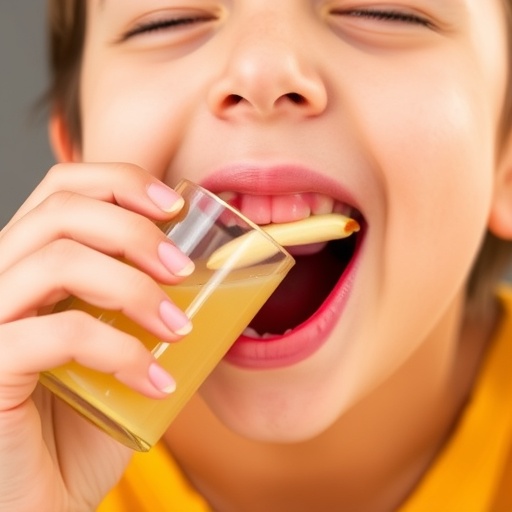
In a groundbreaking study published in PLOS One, researchers from the University of Portsmouth have challenged long-held assumptions about the immediate effects of apple juice on oral health, revealing that our saliva’s natural protective mechanisms are far more resilient than previously believed. This investigation marks the first time advanced scientific techniques, typically reserved for engineering and material science, have been applied to understand how apple juice influences the lubricating and immune functions of human saliva.
Saliva serves as a critical frontline defense within the oral cavity, carefully constructing a thin, slippery film across teeth surfaces that minimizes friction and impedes bacterial colonization. Moreover, this film plays an essential role in the early repair of microscopic enamel damage. While it has long been understood that acidic beverages disrupt this protective coating, the precise nature, timing, and biochemical impact of such disruptions have remained murkyâuntil now.
The study involved 32 healthy adult participants who rinsed their mouths for one minute with apple juice, followed by a similar procedure using tap water for comparison. Remarkably, the research showed that although apple juice momentarily disturbs salivary lubrication, this effect begins to dissipate within just ten minutes, indicating a rapid recovery by salivaâs natural defenses. Even more surprisingly, the team observed that rinsing with local Portsmouth tap water resulted in a more pronounced initial impairment of saliva’s protective film than apple juice didâan unexpected finding that opens new avenues for understanding how water composition influences oral health.
Utilizing highly sensitive tribological measurements, protein concentration analyses, and real-time monitoring of salivary films, the researchers uncovered intriguing shifts in salivaâs protein profile after beverage exposure. Specific immune-related proteins such as immunoglobulins, cystatins, and carbonic anhydrase showed significant reductions following apple juice rinsing, while mucinsâthe primary lubricating proteinsâremained surprisingly stable. This suggests that the lubricating capacity of saliva is maintained even when certain immune components fluctuate, highlighting a complex interplay between the mouth’s physical and immunological defenses.
The composition of tap water used in the study was identified as a key factor influencing saliva’s lubricating properties. Portsmouthâs hard water contains elevated levels of sodium, potassium, and magnesium ions, which appear to interfere with mucin function, leading to greater friction on the oral surfaces compared to the fruit juice’s effects. This is the first time mineral content in water has been shown to detrimentally impact salivaâs lubrication, raising questions about the variable oral health impacts of drinking different types of water globally.
What may be even more consequential is the studyâs revelation of an unexpected connection between dietary acids and the oral immune system. The reduction in immune-responsive proteins following apple juice exposure hints at a direct influence of ingested substances on oral immune competence, potentially cascading to broader systemic immune function. These findings suggest that the components of what we consume have nuanced effects that extend beyond simple mechanical erosion or acid damage.
Lead researcher Dr. Mahdi Mutahar emphasized that while a single brief consumption of apple juice does not cause lasting harm to the mouthâs protective environment, habitual or prolonged exposure could overwhelm salivaâs capacity to recover, ultimately jeopardizing oral health. He likened the mouthâs response to frequent acid exposure to a wound that fails to heal properly if repeatedly reopened, underscoring the importance of moderation and appropriate hygiene practices.
This study also provides practical insights for consumers eager to protect their dental health without foregoing enjoyment of acidic beverages. Recommendations include consuming apple juice quickly rather than sipping over extended periods, using straws to minimize contact with teeth, rinsing the mouth with water promptly after drinking, and allowing intervals for saliva to restore its protective coating before additional intake. Such behaviors optimize salivaâs natural ability to repair and buffer acid-induced damage.
Plans for future research include examining the effects of repeated acid exposures throughout the day, assessing the direct impact of apple juice on tooth enamel beyond saliva, and contrasting these effects against those caused by pure acids. Researchers also intend to explore whether deionized water, free of mineral content, will have differing impacts on saliva, to better understand the mineral interference phenomenon revealed by the Portsmouth tap water findings.
Furthermore, a tantalizing prospect discussed by the team is the possibility of enhancing oral health by supplementing everyday beverages or oral care products with protective salivary proteins. This biotechnological approach could strengthen the mouth’s defenses not only by neutralizing harmful acids but also by accelerating salivaâs natural regenerative functions, potentially revolutionizing oral hygiene and preventive dentistry.
The interdisciplinary collaboration driving this research combined expertise from dental health professionals and materials scientists, creating a novel fusion of knowledge and techniques. Professor Anwesha Sarkar of the University of Leeds, a specialist in colloids and surfaces, contributed to pioneering friction and real-time adsorption measurements used in this study, which elucidate the complex interactions between fluids and biological tissues on a microscopic scale.
This pioneering study fundamentally reshapes how we perceive the early interaction between diet and oral health, emphasizing the adaptive strength of saliva but also cautioning against complacency with frequent acidic drink consumption. It invites a reinterpretation of dietary guidelines and oral hygiene habits, fostering a renewed respect for saliva as a dynamic, potent agent safeguarding dental health.
Subject of Research: People
Article Title: Short-term effects of sweetened acidic beverages consumption on human saliva: Colloidal properties and protein composition
News Publication Date: 3-Sep-2025
Web References:
https://journals.plos.org/plosone/article?id=10.1371/journal.pone.0330023
http://dx.doi.org/10.1371/journal.pone.0330023
References:
Mutahar M., Sarkar A., et al. (2025). Short-term effects of sweetened acidic beverages consumption on human saliva: Colloidal properties and protein composition. PLOS One. DOI: 10.1371/journal.pone.0330023
Keywords: Teeth, Mouth
Tags: acidic beverages and salivaadvanced scientific techniques in oral researchapple juice oral health effectsapple juice study findingsenamel damage repairimmune functions of salivaoral cavity lubricationoral hygiene and dietsaliva protective mechanismssalivary recovery timetemporary impact of apple juiceUniversity of Portsmouth research




